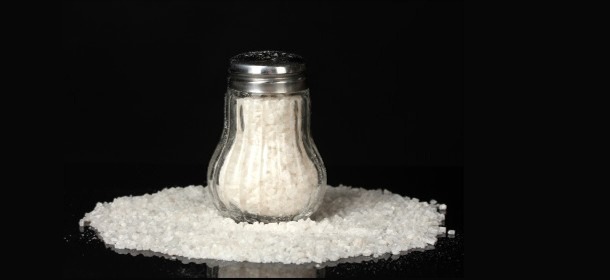Natural Health
Reducing Salt Does Not Reduce Heart Disease: Cochrane Study
Salt reduction is a third rail of medicine. There is simply too much money to be made on blood pressure drugs, and Big Pharma must not be crossed. But the reality is that reducing salt intake provides no benefit for heart health. Nonetheless, the official stance doesn’t change.

by Heidi Stevenson
Salt does not cause heart disease. That statement is a third rail of modern medicine. Even when studies find it’s true, the authors’ conclusions try spin it in the opposite direction. To come out and tell the truth would likely dry up any future funding for studies. Nonetheless, another study has been unable to find a connection between reduced salt intake and heart disease.
Published in the Cochrane Libary, the study entitled “Reduced dietary salt for the prevention of cardiovascular disease” was unable to find a connection between salt intake and heart disease. The authors stated:
We found no strong evidence that salt reduction reduced all-cause mortality in normotensives … or hypertensives.
Now, contrast that statement with their conclusion:
Our findings are consistent with the belief that salt reduction is beneficial in normotensive and hypertensive people.
No, there are no typos. Though they used the term “strong” to modify their results, the data shows that they found no evidence that salt reduction is beneficial for heart health. The authors’ conclusion goes on to state:
Many countries have national authoritative recommendations, often sanctioned by government, that call for reduced dietary sodium. In UK, the National Institute of Health and Clinical Guidance (NICE) has recently called for an acceleration of the reduction in salt in the general population …
Authoritative? I suppose that’s true, if the term means that anything stated by those in “authority” must, by definition, be true. Of course, they don’t explain why being “sanctioned by government” constitutes truth. Nor do they explain why NICE’s acceleration of salt reduction is necessarily appropriate.
Salt reduction is currently a third rail of medicine. Thou shalt not question the importance of salt reduction in heart health. There is simply too much money to be made on blood pressure drugs, and Big Pharma must not be crossed.
Logic? We Don’t Need No Stinkin’ Logic!
The typical logic for continuing to press people to reduce salt intake tends to go like this:
Reducing salt reduces blood pressure.
Reducing blood pressure reduces heart attacks.
Therefore, reducing salt must reduce heart attacks.
The problem is that the only statement with any truth is the first, that less salt equates with lower blood pressure—and even that is only minimally true. However, reducing blood pressure does notcorrelate with less heart disease. And, as is becoming obvious—in spite of attempts to demonstrate the opposite—reducing salt does not prevent heart disease.
The authors’ logic was that, since they managed to demonstrate a very small reduction in blood pressure, then it must be true that reducing salt reduces heart attacks, since everyone knows that reducing blood pressure prevents heart attacks.
Official Complaints About the Study
Katharine Jenner, the campaign director of Consensus Action on Salt and Health (CASH), expressed disappointment in the study:
It is very disappointing that the message from this small review indicates that salt reduction may not be beneficial. This is a completely inappropriate conclusion, given the strong evidence and the overwhelming public-health consensus that salt raises blood pressure, which leads to cardiovascular disease.
There’s that fallacy again. Will they ever learn that you can’t make something so by saying it over and over? And when did “public-health consensus” constitute proof that something is true? If it were, do you suppose that we could overturn the law of gravity? Wouldn’t that be neat? Just get together, decide that there’s no longer a consensus on the existence of gravity—and we could all start flying!
Just who is CASH? It’s an organization that exists solely for the purpose of promoting reduction in salt intake. What on earth will they do if the “public-health consensus” on salt ever admits the truth?
Francesco Cappuccio, head of the World Health Organisation’s collaborating center for nutrition at Warwick University, described the study as “a surprisingly poor piece of work,” but doesn’t say what was wrong with it, though he went on to state in an e-mail:
This study does not change the priorities outlined worldwide for a population reduction in salt intake to prevent heart attacks and strokes, the greatest killers in the world.
The WHO has recently been shown to be heavily influenced by Big Pharma, so their response shouldn’t be surprising.
Health Consensus on Salt Is Meaningless
If there really were a scientific consensus about salt, then one would expect to see similar salt reduction advice given by different countries. That, though, is far from the case. In the US, the government’s standard is 2.3 grams of salt per day in people with no known risk of heart disease, and even greater restriction for those with high blood pressure. In the UK, the goal is to reduce salt intake to 6 grams per day, nearly 3 times more! Obviously, these figures are not based on studies. They are pulled out of thin air.
Reports on this study seem to imply that this is the first one to demonstrate that salt does not harm heart health. However just two months ago, the Journal of the American Medical Associationreported on a study, Heart Disease Deaths Four Times Higher With Low Salt Intake: JAMA Study that shows a strong connection between mortality from heart disease and low salt usage.
Both the Cochrane and JAMA studies demonstrate that modern medicine is not evidence-based. It’s largely based on beliefs that are based on faith, not on facts or experience—and certainly not on science.
Sources:
Tagged conventional medicine, modern medicine, reducing salt does not reduce heart disease, salt, salt cochrane collaboration, salt cochrane study, salt does not cause hypertension, salt heart, salt heart disease prevention, salt hypertension, salt intake, salt reduction, salt reduction heart disease, salt reduction hypertension, salt reduction nice, science
Related Posts
One thought on “Reducing Salt Does Not Reduce Heart Disease: Cochrane Study”














You shoud also think that may be a part of the salt is most beneficial than others, and this is proved very well since 100 years almost : the effect of Magnesium Chlorure MgCl2 on the whole body regulations and mainly on the immune system has been studied by Delbet and some others in scientific protocols. It would explain perfectly the effet of Dead sea water for instance.